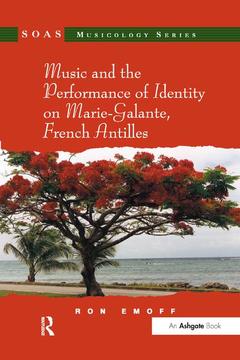Marie-Galante is a small island situated in the Caribbean to the south of Guadeloupe. The majority of Marie-Galantais are descendants of the slave era, though a few French settlers also occupy the island. Along with its neighbours Guadeloupe and Martinique, Marie-Galante forms an official département of France. Marie-Galante historically has never been an independent polity. Marie-Galantais express sentiments of being 'deux fois colonisé', or twice colonized, concomitant with their sense of insularity from a global organization of place. Dr Ron Emoff translates this pervasive sense of displacement into the concept of the 'non-nation'. Musical practices on the island provide Marie-Galantais with a means of re-connecting with other significant distant places. Many Marie-Galantais display a 'split-subjectivity', embracing an African heritage, a French association and a Caribbean regionalism. This book is unique, in part, with regard to its treatment of a particular mode of self-consciousness, expressed musically, on a virtually forgotten Caribbean island. The book also combines literary, narrative, historical and musical sources to theorize a postcolonial subsurreal in the French Antilles. The focus of the book is upon kadril dance and gwo ka drumming, two prevalent musical practices on the island with which Marie-Galantais construct unique perceptions of self in relation, specifically, to Africa and France. Based on several extended periods of ethnographic research, the book evokes unique Marie-Galantais views on tradition, historicity, esclavage, nationalism (and its absence) and the local significance of occupying a globally out-of-the-way place. The book will be of interest not only to ethnomusicologists, but also to those interested in cultural and linguistic anthropology, postcolonial studies, performance studies, folklore and Caribbean studies.


